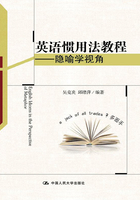
前言和致谢
English Idioms for Chinese Students—compiled by Mr. Zhang Yongxian and published in China Renmin University Press in 1998—has been out of stock. There being no proper textbook for the course “English Idioms,” we decided to write this one in the perspective of metaphor so that the learners can learn English idioms with a concept of metaphology.
Therefore, we would like to take the course as a branch of studies in metaphor, which focuses on human embodiment and the association based on similarity. What we discuss, in fact, is the association vehicles which are used to express the association tenors. With a good command of the knowledge, learners are expected to have a better understanding of the wit to use something embodied and therefore familiar to indicate what is unfamiliar, abstract and hard to comprehend—the basic cognition for the human beings. For instance, food can be used to signify some concepts such as “idea” in the idiom of “Your idea is half-baked.” We are then likely to know the meaning of some idiomatic expressions such as “He snapped his fingers at our plan (ignored)” and “Are you chicken (a coward)?” We may also find it easier to express some seemingly familiar but difficult ideas. For example, when we try to say “to stay in a place when lovers want to stay by themselves” (in Chinese,当电灯泡), we may apply one idiom “to play gooseberry,” which is concise and vivid. We do not intend to cover all idioms but to sow the seed of the above-mentioned conception.
We have eight sections, based on the major vehicles, altogether:
Section One: General Outlook of English Idioms (Unit 1)
Section Two: Some Basic Theories and Time Idioms (Unit 2)
Section Three: Body Idioms (Units 3-8)
Section Four: Food Idioms (Units 9-10)
Section Five: Clothes Idioms (Units 11-12)
Section Six: Idioms Concerning Spacial Relationship (Unit 13)
Section Seven: Nature Idioms (Units 14-17)
Section Eight: Idioms Concerning Social Culture (Unit 18)
Moreover, it is hoped that learners can get a lot of cultural background knowledge in idiom learning, for idioms are the crystallization of culture. The sources of some idioms are offered in Chinese for better understanding. And to strengthen the acquisition and the application of the knowledge, we have provided various exercises such as paraphrasing or matching for the sake of a better cognition of the idioms, English-Chinese and Chinese-English translation for a deeper understanding of the similarities and differences between English and Chinese idioms, and reflection with the hope of applying what has been learnt into practice.
What needs to be emphasized is that some idioms are used in a special regional way, i.e., some idioms are used only in the UK (“to chance one's arm”for example) or in the USA (“to cop a plea” for instance) or in Australia (“to point the bone at sb.” for example) or in New Zealand (“Are you a kiwi?” for instance).
A special thank is extended to Prof. Zuo Biao, Ms. Jo Bissett and Mr. Dave Fern from Auckland Edinburgh College, New Zealand, for their encouragement, improvement of the book and their writing of foreword. To Ms. Cheng Zishu, Ms. Tong Xiaolan, Ms. Zhang Weihua, Mr. Gao Yongxin, and Mr. Liu Shunli, who gave us selfless help and many writers from whom we get much nutrition, esp. Prof. Zhang Yongxian, we owe a special debt.
Wu Keyan, Qiu Xuping
Zhangzhou
Feb. 10, 2014